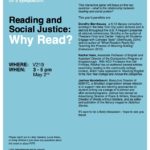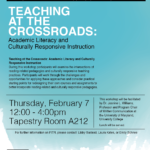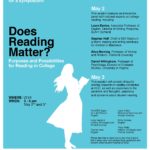Home » 2022 Spring
Category Archives: 2022 Spring
Spring 2022 Meeting # 2
Meeting #2 5/2/21
4:10 pm
Reading:
“’You are asking me to do more than just read a book’: Student Reading in a General Literature Course” — Ann N. Amicucci, Michael M. Williamson, Sarah E. DeCapua, and John R. Hrebik
At our second meeting of the spring semester, we discussed Amiccui, Williamson, DeCapua, and Hrebik’s article, “You are asking me to do more than read a book.”
We paid particular attention to the author’s coding matrix, raising inquiries into the methodology and terminology for “ways of reading” and “role of reading.” The authors also indicate that “working with non-majors in a course that demands a great deal of students as readers is quite different from working with students who are perhaps more drawn to the task of reading literature” (p. 2). We considered how this statement has significance for community college instructors.
Moreover, we discussed how reader identity can be shaped within a class (through the practice of making meaning from a text) but also by a course (through the position the course places a student: honors, developmental, etc.).
We ended our discussion by considering a variety of texts for session 3.
Spring 2022 Meeting #1
Faculty Interest Group Notes
“Does Reading Matter?”
Monday, 4/4
4:10 – 5:10, via Zoom
Readings: “The Intersection of Reading and Identity in High School Literacy Intervention Classes”
— Katherine K. Frankel
At our first meeting of the spring semester, we discussed Katherine K. Frankel’s article “The Intersection of Reading and Identity in High School Literacy Intervention Classes.” With an interdisciplinary group of participants, we discussed how the academic infrastructure described in Frankel’s piece both mirrored (and at times differed from) that which we have experienced at Kingsborough Community College. We discussed the through lines between the “Literacy Intervention Classes” described in the piece and the history of academic remediation, developmental studies, and basic reading and writing at CUNY.
In particular, we examined how tracking in such a way has historically generated prescriptive norms for students – ones that often framed not only their academic performance but also their sense of self. In this regard, we reflected on our previous readings and last semester’s sessions, examining the role of dialogical practice in developing meaningful reading pedagogies for our students.
We ended our discussion with an open conversation fielding possible readings and directions for the remaining spring sessions.





